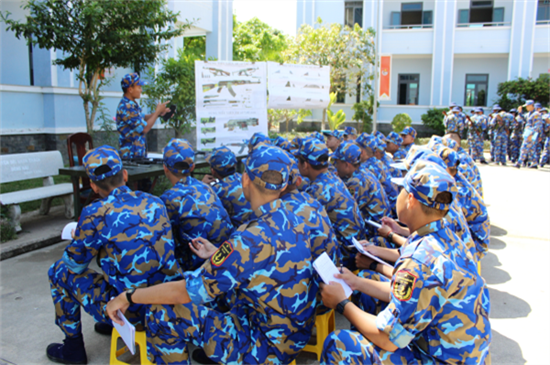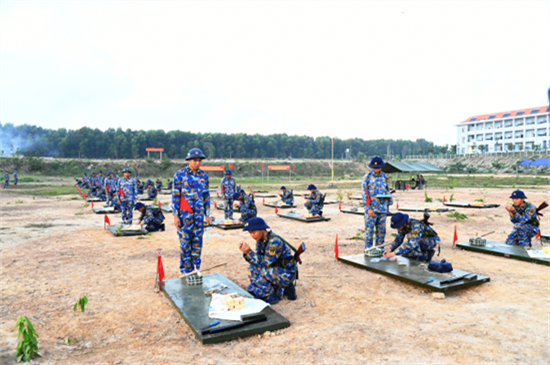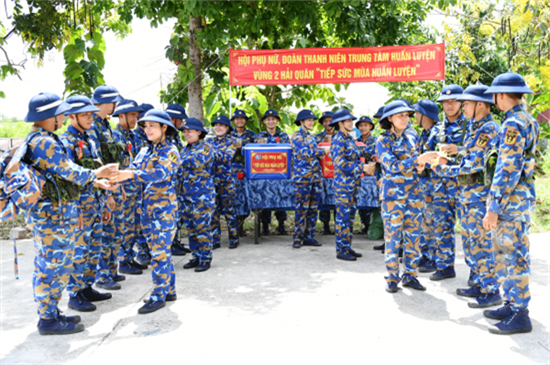Naval Region 2’s Training Centre steps up regularity building, discipline management, and safety assurance
Naval Region 2’s Training Centre is tasked with training commanding non-commissioned officers, new recruits, and technical and professional personnel for ship units and service arms as well as the reserve force.
Since its inception in April 2020, the Centre has undertaken a heavy workload. It has managed and trained diverse groups of troops with differing levels of knowledge and awareness. Meanwhile, its strength has always been insufficient due to regular duty rotations on islands and DK-1 platforms. In response to its practical conditions and task requirements, a part from the performance of all missions, the Centre’s Party Committee and Command have attached great importance to achieving strong, clear, steady improvements in regularity building, discipline management, and safety assurance, thereby laying a solid foundation for building an “exemplarily, typically” comprehensively strong unit capable of excellently fulfilling all assigned tasks.
 |
| Theoretical training for troops |
Leadership and direction from party committees and commands at all levels over regularity building, discipline management, and safety assurance play a vital, consistent role. Hence, the Centre’s Party Committee and Command have regularly grasped directives, circulars, regulations, and resolutions on regularity building, discipline management, and safety assurance, especially the Region Party Committee’s Resolution 32-NQ/ĐU, dated 30 June 2020, and Directive 1601-CT/ĐU, dated 30 September 2024, by the Region Party Committee Standing Board on “enhancing regularity building, discipline management, and safety assurance”. Thanks to this approach, leaders and commanders at all levels have been fully aware of the importance of this work, promoting their sense of responsibility in formulating guidelines and measures of leadership and direction, including this work in their regular resolutions and plans as well as in the building of “exemplarily, typically” comprehensively strong units.
In the process, the Centre has required its offices and units to regularly, promptly supplement, refine, and strictly adhere to the working regulations and procedures of party committees and commands at all levels, and renew their leadership style towards grass-roots level. It has strengthened inspection and supervision and maintained preliminary and final reviews to draw lessons and settle weaknesses completely. At the same time, it has required its offices and units, particularly its battalions directly responsible for managing, training, and educating cadets and soldiers, to follow the mottos, namely “offices set examples for units”, “superiors set examples for subordinates”, “leaders act exemplarily, subordinates actively follow”, and “speak and act in accordance with military regulations”. The results of regularity building, discipline management, and safety assurance have been used as key criteria for monthly, annual evaluation, commendation, and classification of collective and individual performance. Notably, the Centre has integrated regularity building, discipline management, and safety assurance in the study and following of Ho Chi Minh’s ideology, ethics, and lifestyle and the execution of the Central Military Commission’s Resolution 847-NQ/QUTW, while encouraging the pioneering, creative role of its mass organisations to achieve widespread positive effects.
The Centre’s Party Committee and Command have attached special importance to education and propagation work to make a basic change in troops’ discipline-abiding awareness. In the process, the Centre has directed its offices and units to synchronously adopt political and ideological education measures, closely combine education with persuasion, carry out emulation campaigns on regularity building and discipline management, and organise diverse political activities. To make the content of law education and propagation easy to understand and realise, the Centre’s affiliates have flexibly applied various forms, such as topics-based study, legal dissemination by rapporteurs, seminars and forums suitable to the particularities and awareness level of each group, and dissemination of “good people, good deed” examples. Emphasis has been placed on clarifying the importance and necessity of regularity building, discipline management, and safety assurance and providing updates on Troop Management Regulations, Garrison and Guard Regulations, and other rules for regularity building, discipline management, and safety assurance. The Centre has also clarified risks of violating the Military’s discipline and the State’s laws, while disseminating traffic safety laws, the Law on Cybersecurity, and regulations on social media use and codes of conduct. Doing so has enabled cadres, cadets, and soldiers to fully understand the position and importance of regularity building and discipline management to the raised quality of training and education, identify their responsibility, foster self-awareness, “immunity”, and “resistance” against the negative impacts of the market economy and social evils, and promote the virtues of “Uncle Ho’s Soldiers - Naval Soldiers”.
 |
| A training session on explosive handling |
In order to build a standardised unit and “bright, green, clean, beautiful” barracks, all offices and units have been required to actively implement the criteria for “standardised and exemplary” Naval Region 2’s Training Centre. The Centre has strictly maintained daily, weekly regulations; all missions and activities have been planned, assigned to commanders, and subject to clear, specific inspection, evaluation, and review. Offices and units have closely combined regularity building with the construction and standardisation of barracks, signs, and boards. Living quarters and working rooms have been neatly arranged; troops have been required to follow proper military etiquettes. The system of records and documents has been fully registered and properly archived. Offices and units have well carried out administrative reform, applying information technology, promoting digital transformation, upholding democracy, tightening discipline, heightening accountability, ensuring unity in management, command, and operation at all levels. At the same time, the Centre has actively organised cultural, artistic, and sport activities to develop a healthy cultural environment and close, united relationships between cadres and soldiers; it has also regularly ensured material and mental life for its cadres, cadets, and soldiers.
To achieve a breakthrough in discipline management, the Centre has always set high requirements for its offices, units, and individuals. It has developed models in terms of regularity building and discipline management and required each individual to make written commitments to strictly observe laws and military discipline. It has directed its affiliates to frequently maintain reports and reviews regarding discipline management on a monthly, quarterly, semi-annual, and annual basis at all levels. It has required its offices and units to promptly grasp and classify ideological developments among troops, and strengthen coordination with local authorities and families to manage troops, opportunely detect and correct any negative ideological issues. Within cadet management battalions, the roles and functions of mass organisations, soldiers’ councils, three-person groups, and psychological counselling teams have been promoted to effectively manage troops’ ideology and relationships. The Centre has closely managed its troops during rest hours, days off, leaves, and holidays. Besides, it has organised various cultural, artistic, and sport activities, conducted reviews and experience exchanges, commended outstanding individuals, and resolutely fought improper perceptions and disciplinary violations. As a result, for many consecutive years, it has recorded no serious disciplinary violation, while the rate of minor violations has remained below 0.16%.
 |
| Members of the Women’s Union give encouragement to soldiers in training |
In addition, the Centre has attached significance to ensuring safety in training and traffic participation. Accordingly, all offices and units have grasped and strictly complied with higher echelons’ directives on training work. Due attention has been paid to establishing and consistently enforcing principles, regulations, and procedures for safety assurance, especially during live-fire tests, grenade throwing, and explosive handling for new recruits. The Centre has regularly organised alcohol concentration checks at its gates to prevent individuals from using vehicles after consuming alcohol; it has also proactively taken measures to prevent and strictly handle any signs of negligence or potential safety risks, particularly in traffic participation. Commanding officers and technicians have been required to take part in equipment maintenance and use. At present, 100% of the Centre’s warehouses, stations, garages, swimming pools, guard posts, and areas for the operation and use of weapons, technical equipment, and machinery have been equipped with safety regulations. The Centre has also strictly managed information in the use of the Internet and social media, while handling official documents and materials in accordance with confidentiality regulations to prevent any leakage of military secrets. For many consecutive years, it has maintained absolute safety in terms of personnel, weaponry, documents, and traffic participation.
Those above-mentioned experiences and key measures are being applied by Naval Region 2’s Training Centre to further raise the quality of regularity building, discipline management, and safety assurance and contribute to building an “exemplarily, typically” comprehensively strong Centre capable of excellently accomplishing all assigned tasks.
Sr. Col. DAU DINH DAN
Commander of the Centre